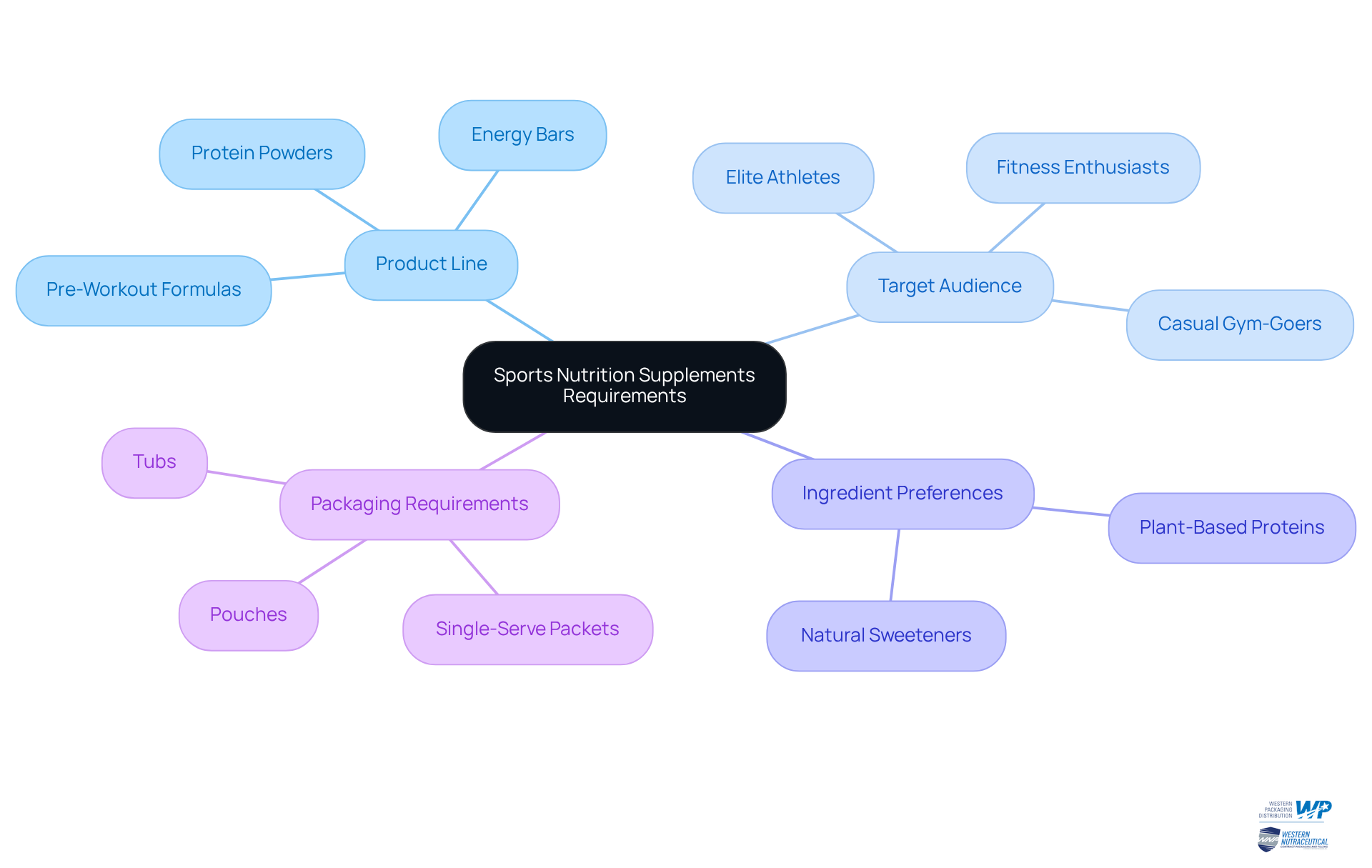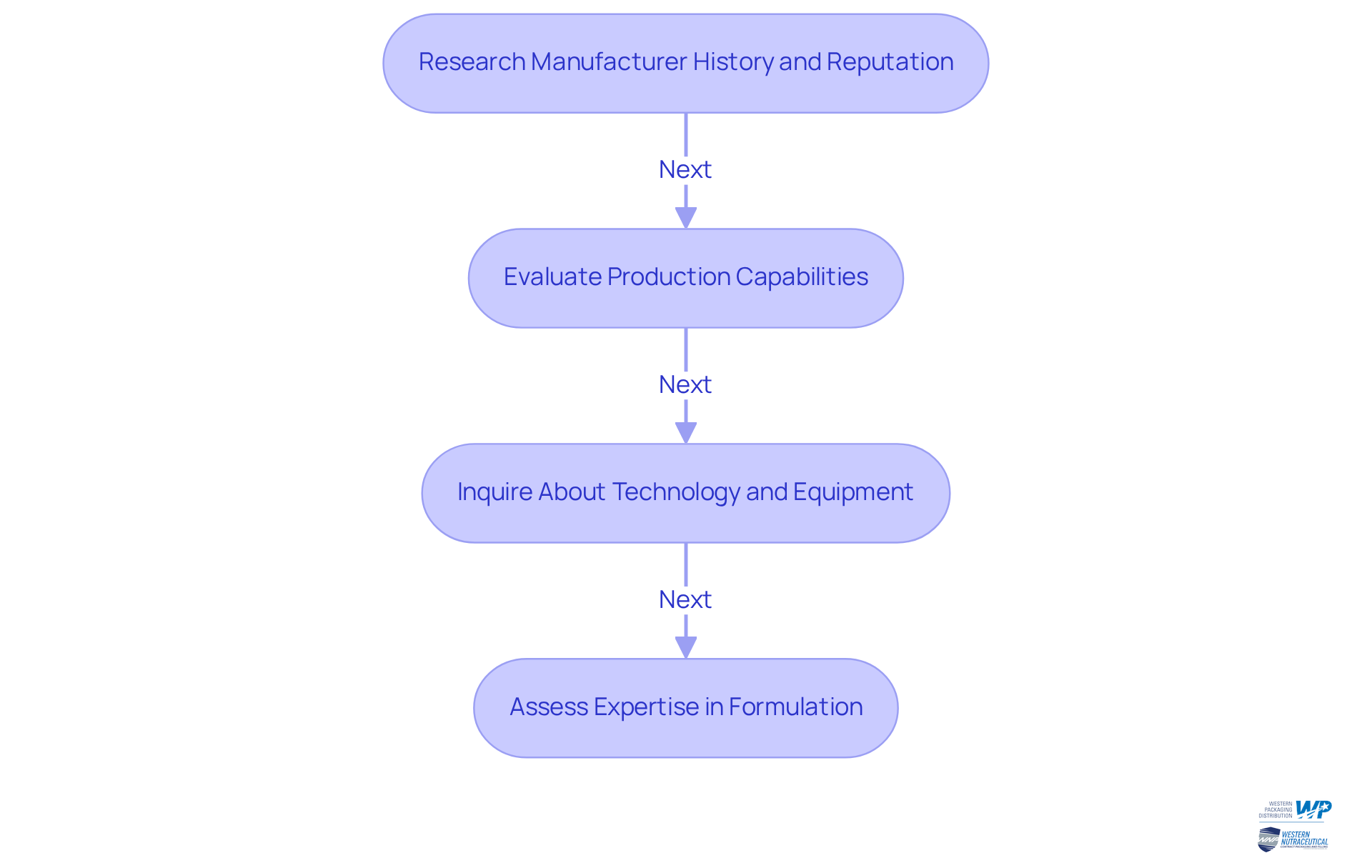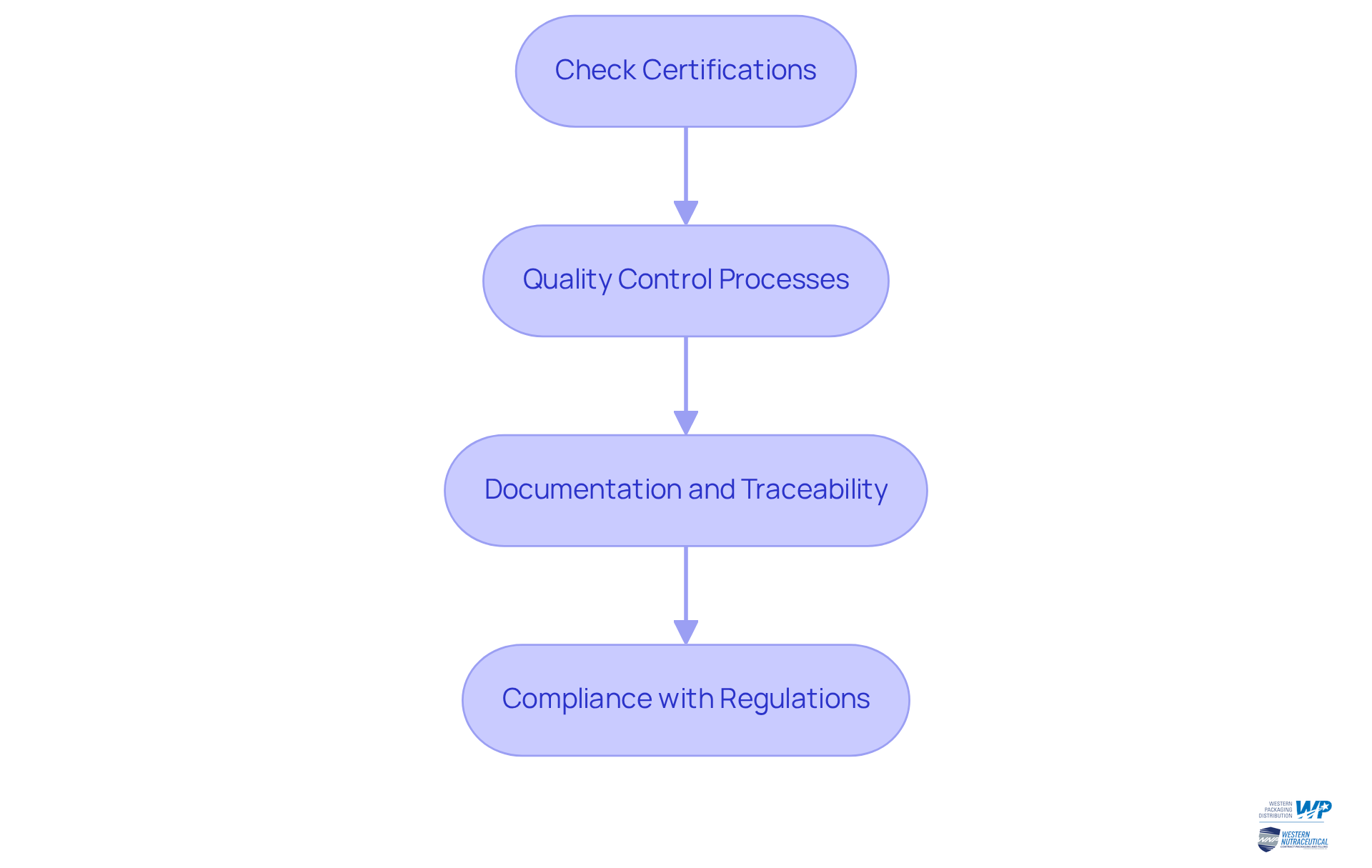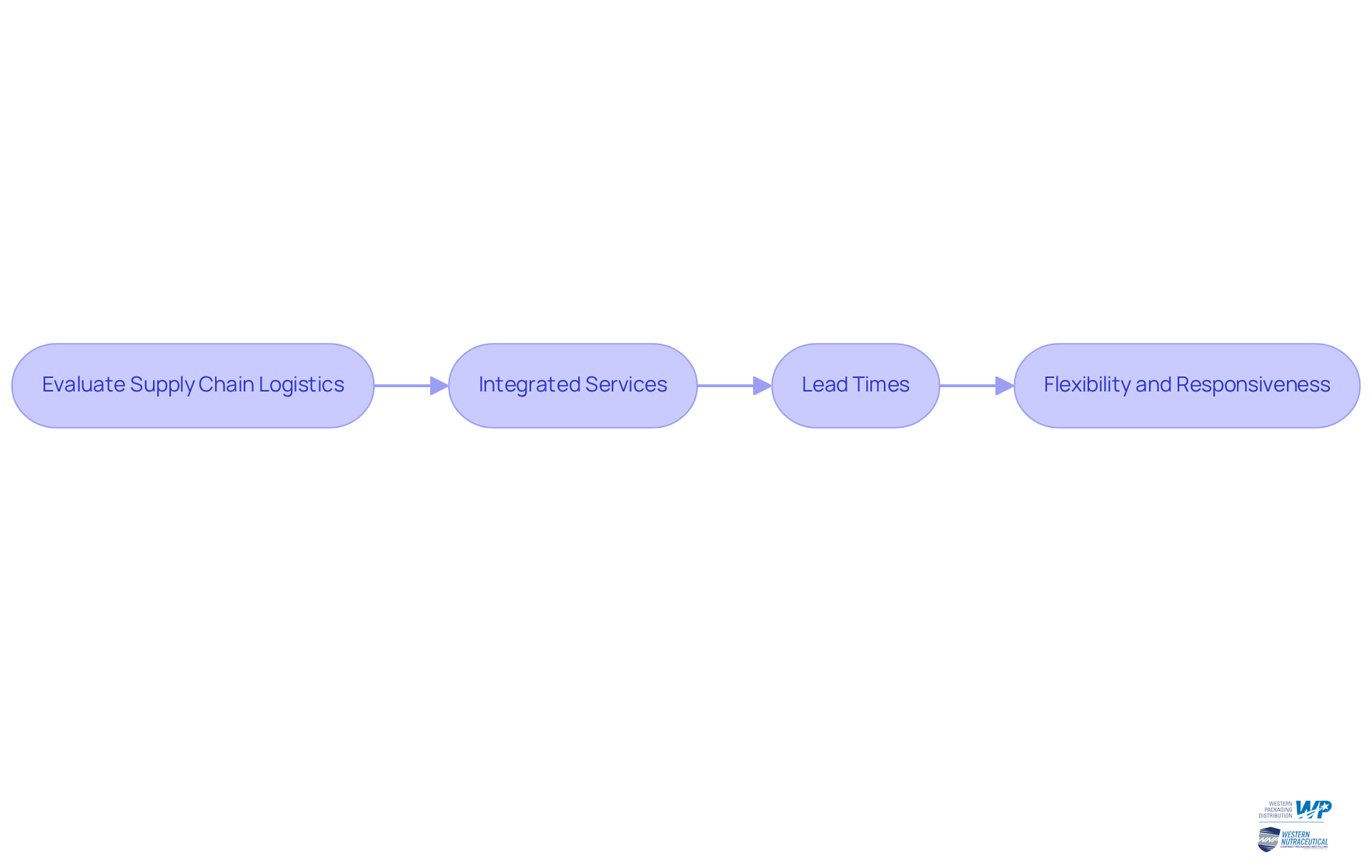Overview
Selecting a sports nutrition supplements manufacturer necessitates a careful identification of specific requirements, including:
- Product types
- Target audience
- Ingredient preferences
- Packaging needs
Grasping these factors is crucial, as it allows for a thorough evaluation of the manufacturer's capabilities, adherence to regulations, and efficiency of the supply chain. This understanding not only fosters a successful partnership but also ensures alignment with market demands and consumer expectations.
Introduction
Choosing the right sports nutrition supplements manufacturer is a pivotal decision for brands aiming to thrive in a booming market projected to reach USD 75 billion by 2030. With diverse product lines ranging from protein powders to energy bars, understanding specific requirements and consumer preferences is essential. However, the challenge lies in navigating a landscape filled with potential partners, each claiming expertise and quality. Brands must prioritize criteria that ensure their chosen manufacturer not only meets industry standards but also aligns with evolving consumer demands.
Identify Your Specific Requirements for Sports Nutrition Supplements
- Define your product line by determining the specific types of products that your sports nutrition supplements manufacturer aims to produce. This could involve protein powders, energy bars, or pre-workout formulas, each addressing various individual needs and preferences.
- Target Audience: Identifying your target demographic is crucial. Consider segments such as elite athletes, fitness enthusiasts, or casual gym-goers. Comprehending these groups will allow a sports nutrition supplements manufacturer to customize features and marketing strategies effectively. For instance, the sports nutrition sector is projected to reach USD 75 billion by 2030, with a significant share of individuals aged 18 to 34, indicating a growing demand for offerings that resonate with younger audiences.
- Ingredient Preferences: Decide on the ingredients you wish to incorporate. Are you focusing on plant-based proteins, specific amino acids, or natural sweeteners? This choice will significantly influence your selection of manufacturers, particularly those with robust ingredient sourcing capabilities. As consumer preferences shift towards clean and natural offerings, ensuring your ingredients align with these trends is essential for achieving success.
- Packaging Requirements: Consider your packaging needs, including the type (e.g., pouches, tubs, or single-serve packets) and any branding elements you wish to incorporate. Efficient packaging not only safeguards the item but also enhances shelf appeal and brand recognition, which are critical in a competitive market. Western Packaging specializes in customized flexible packaging solutions that elevate your item's shelf appeal and brand recognition. Additionally, we provide compelling graphic assets, including labels and brochures, to ensure a cohesive brand identity. With , appealing packaging can attract a diverse consumer base, including older demographics seeking functional nutrition solutions. Trust Western Packaging to deliver innovative packaging that meets your unique requirements and enhances product appeal.

Evaluate Manufacturer Capabilities and Expertise
- Begin your research on the sports nutrition supplements manufacturer by investigating their history, particularly their tenure in the sports nutrition sector and their reputation among clients. A well-established producer often signifies reliability and experience in addressing diverse client needs.
- Production Capabilities: Next, evaluate their production capacity to ensure they can accommodate your order volumes. Understanding their minimum order quantities and scalability options is crucial for sports nutrition supplements manufacturers, especially as the , reaching approximately USD 49.60 billion in 2024 and USD 75 billion by 2030. This growth underscores the necessity for producers to be prepared to manage rising demand.
- Technology and Equipment: Inquire about the technology and equipment utilized in the manufacturing process. Advanced technology not only enhances product quality and consistency but also aligns with the industry's shift towards innovative formulations. For instance, the demand for collagen-based supplements has surged, experiencing a 17% rise since 2021, prompting producers to adopt advanced methods to satisfy buyer preferences.
- Expertise in Formulation: Assess whether the producer possesses expertise in creating the specific types of supplements you wish to produce. This includes a comprehensive understanding of ingredient interactions and effective dosages. As the market evolves, the sports nutrition supplements manufacturer must adapt to consumer demands for healthier compositions, with a focus on high-quality ingredients and transparency in sourcing. Industry specialists assert that producers who prioritize these aspects are better positioned to succeed in a competitive environment. Furthermore, it is essential for producers to ensure clarity to differentiate their products from doping substances, as highlighted by industry expert Pierre. Additionally, producers face challenges such as stringent regulations regarding product assertions and quality management, which must be navigated to maintain compliance and consumer confidence.

Assess Regulatory Compliance and Quality Control Standards
- Check Certifications: It is imperative to ensure that the producer possesses essential certifications, such as Good Manufacturing Practices (GMP) and NSF certification. These credentials signify a commitment to maintaining high-quality standards, which is crucial for sports nutrition supplements manufacturers in the competitive market. For example, NutriSport Pharmacal demonstrates Part 111 CGMP compliance, showcasing their adherence to stringent manufacturing practices.
- Quality Control Processes: A thorough examination of the producer's quality control measures is essential. These should encompass rigorous testing of raw materials, in-process evaluations, and final product assessments. Specific testing protocols—including microbiological and heavy metal testing—are vital to ensuring the safety and efficacy of dietary supplements, especially for a sports nutrition supplements manufacturer, where performance and health are paramount.
- Documentation and Traceability: Confirming that the producer maintains meticulous documentation of their processes is crucial, as is their ability to trace ingredients back to their source. This level of accountability and transparency is essential for building consumer trust and ensuring . Furthermore, producers should confirm certificates of analysis (COA) and conduct independent testing of raw materials upon arrival to guarantee quality.
- Compliance with Regulations: It is necessary to verify that the producer adheres to local and international regulations governing dietary supplements, including labeling requirements and health claims. Compliance with these regulations not only protects consumer health but also enhances the reputation of a sports nutrition supplements manufacturer in a market increasingly centered on quality and integrity. As industry specialists emphasize, selecting a trustworthy producer is crucial for guaranteeing the safety and effectiveness of the products.

Consider Supply Chain Efficiency and Integrated Services
- Evaluate Supply Chain Logistics: Assess the manufacturer's logistics capabilities, including warehousing, inventory management, and distribution. A robust logistics system is essential for enhancing product availability and ensuring timely delivery, which is critical for a sports nutrition supplements manufacturer in the competitive industry. The global sports market is projected to exceed 600 billion dollars in 2023, underscoring the necessity of efficient logistics for maintaining a competitive advantage.
- Integrated Services: Consider whether the producer provides additional services such as packaging design, labeling, and fulfillment. Integrated services not only streamline operations but also minimize the reliance on multiple vendors, resulting in enhanced efficiency and cost savings. For instance, companies that utilize integrated services often report improved coordination and faster time-to-market for their products. A prominent example is Heineken's collaboration with Palantir, which harnessed AI-driven supply chain transformation to boost operational efficiency.
- Lead Times: Inquire about the producer's lead times for production and delivery. Efficient lead times are vital for meeting market demands and launching products on schedule. A manufacturer with streamlined processes can significantly reduce delays, enabling brands to respond swiftly to consumer trends.
- Flexibility and Responsiveness: Evaluate the manufacturer's ability to adapt to changes in demand or specifications. A responsive partner can adeptly navigate market fluctuations, ensuring that your product offerings remain relevant and competitive. Industry leaders highlight that flexibility in manufacturing processes is crucial for sustaining growth and customer satisfaction in the dynamic field of sports nutrition supplements manufacturer. Tim Cook, CEO of Apple, emphasized, "No supply chain is more critical than China," highlighting the significance of in achieving operational success.

Conclusion
Choosing the right sports nutrition supplements manufacturer is a pivotal decision that can significantly impact the success of a product line. Clearly defining specific requirements—such as product types, target demographics, and ingredient preferences—enables brands to streamline their selection process. Understanding the capabilities and expertise of potential manufacturers, alongside their compliance with regulatory standards, ensures that quality and safety remain paramount.
Essential considerations include:
- Evaluating production capacity
- Technology
- Quality control processes
It is crucial to select a manufacturer that meets these criteria while also demonstrating a commitment to transparency and accountability. Furthermore, assessing supply chain efficiency and the availability of integrated services can provide a competitive edge in a rapidly growing market.
In an evolving landscape where consumer preferences shift and the demand for high-quality sports nutrition products rises, making informed decisions about manufacturers becomes crucial. Brands should prioritize partnerships that align with their values and goals, ultimately fostering success and trust in the marketplace. Engaging with a reliable manufacturer not only enhances product quality but also paves the way for innovation and growth in the sports nutrition industry.
Frequently Asked Questions
What should I consider when defining my sports nutrition supplement product line?
You should determine the specific types of products you aim to produce, such as protein powders, energy bars, or pre-workout formulas, each catering to different individual needs and preferences.
Why is identifying a target audience important for sports nutrition supplements?
Identifying your target demographic, such as elite athletes, fitness enthusiasts, or casual gym-goers, is crucial for customizing features and marketing strategies effectively. Understanding these groups helps in addressing their specific needs and preferences.
What is the projected market size for the sports nutrition sector by 2030?
The sports nutrition sector is projected to reach USD 75 billion by 2030, with a significant share of consumers aged 18 to 34, indicating a growing demand for products that resonate with younger audiences.
How do ingredient preferences impact the selection of sports nutrition supplement manufacturers?
Your choice of ingredients, such as plant-based proteins or natural sweeteners, will significantly influence your selection of manufacturers, especially those with strong ingredient sourcing capabilities. Aligning with consumer trends towards clean and natural offerings is essential for success.
What should I consider regarding packaging for sports nutrition supplements?
Consider the type of packaging you need (e.g., pouches, tubs, or single-serve packets) and any branding elements to incorporate. Efficient packaging enhances shelf appeal and brand recognition, which are critical in a competitive market.
How can packaging influence consumer attraction in the sports nutrition market?
Appealing packaging can attract a diverse consumer base, including older demographics seeking functional nutrition solutions. Customized packaging solutions can elevate your item's shelf appeal and ensure a cohesive brand identity.




